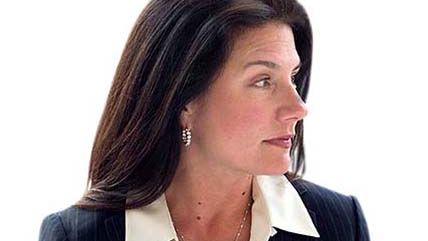Cassandra of the Crash: An Interview With Former Dallas Fed Researcher Danielle DiMartino Booth

Danielle DiMartino Booth worked for nine eventful years at the Federal Reserve Bank of Dallas from 2006 to 2015 under Chairman and CEO Richard Fisher. Even prior to her Fed stint, as a columnist for the Dallas Morning News, Booth had written that "a huge amount of work will be required in the coming years to address the fallout of the largest financial bubble in history…far beyond the realm of residential real estate."
She writes about her experiences in the new book Fed Up: An Insider's Take on Why the Federal Reserve is Bad for America (Portfolio/Penguin). Senior Editor Brian Doherty interviewed Booth by phone shortly after the Fed announced in March its third interest rate target hike since 2006.

Q: Is the Fed on track to interest rate sanity now?
A: It's too little, too late. [Federal Reserve Chair] Janet Yellen continues to be drawn to her academic roots as a labor economist, and wants to keep rates lower for longer [because she hopes it will] bring marginal workers off the sidelines. But the price is what we are giving up in tomorrow's financial instability.
Q: Do you think Fed policy might have influenced the past few years' stock market run-up?
A: Might? You can connect the dots. With the lowest interest rates in 5,000 years, you have companies borrowing to buy back shares and have earnings per share go up. It's mathematical. Thank you, Fed! Yet what have they done in creating anything of lasting economic sustained growth? Look at productivity growth, and you'll see it's a whole lot of nothing. I'm not casting stones [at the companies whose stock price is going up]. They are behaving rationally in a world where central bankers are behaving irrationally.
Q: Is propping up Wall Street at the expense of Main Street a meaningful way to critique the past decade of Fed policy?
A: Check the average yield on a certificate of deposit [and it's clear normal savers, who don't want to play the stock market, are in trouble]. Even if you take the garbled inflation metric the Fed uses that doesn't apply to anything on planet Earth, core CPI [Consumer Price Index, which doesn't count things like energy and food that most Americans spend a lot on], you see Main Street cannot be prudent in its investment decisions. My 70-year-old retired mother asks, "Shouldn't I have something higher yield?" But I say, "Mom, you are 70, you are not getting junk bonds."
Q: You make a bit of a joke in your book aimed at Ron Paul and his end/audit-the-Fed movement.
A: My issue with Ron Paul is that if you install a political-agenda-free individual in leadership of the Fed, it won't need to be audited and will run itself appropriately. People can be put into the position of leading the Fed who have been on the receiving end of Fed policy [as businesspeople] and don't need it to be a shrine to [John Maynard] Keynes [the British economist associated with the idea that government often should borrow and spend to jumpstart economic growth]. There is not enough diversity in the way economics is approached inside the Fed, too much groupthink and too many academics.…Hire people who can read a balance sheet!
[The real reform the Fed needs] is to take away its 1977 dual mandate [to keep both inflation and unemployment low]. Take it back to a single mandate to make the dollar in our wallet buy the same tomorrow as it does today, and call it a day.
Q: You're critical of the bailout mentality, but you also think that not bailing out Lehman Brothers may have been a mistake. What can be done about "too big to fail"?
A: We need to just take the taxpayer safety net out from underneath risk taking and bring back a two- to three-page [version of] the Glass-Steagall Act, [dictating] not that [a financial institution] shouldn't be able to engage in risky behavior. Just take taxpayer backing from any activity considered to be too risky. Risk takers should always be allowed to fail.
This interview has been condensed and edited for style and clarity.
This article originally appeared in print under the headline "Cassandra of the Crash."


Show Comments (5)